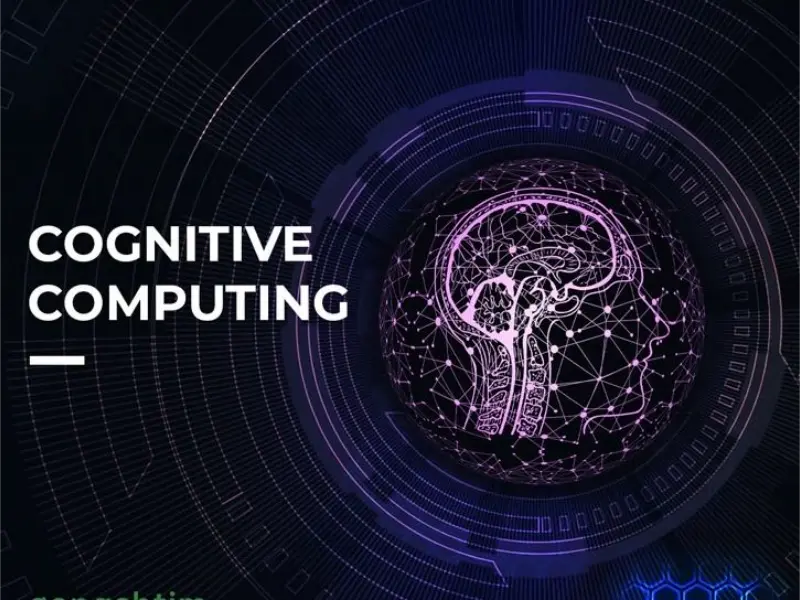- AI and cognitive computing impact decision-making, automation, and user experiences by providing data-driven insights, predictive analytics, and personalised interactions.
- AI and cognitive computing revolutionise industries like healthcare and finance, improving outcomes, reducing costs, and enhancing decision-making processes.
- Future trends in AI and cognitive computing include advancements in technology, ethical considerations, and regulatory frameworks to govern their responsible use.
AI and cognitive computing are two distinct technologies that aim to create intelligent systems. AI focuses on tasks requiring human intelligence, like perception, reasoning, and problem-solving, while cognitive computing mimics the human brain’s ability to perceive, learn, and interact naturally. AI uses machine learning, deep learning, natural language processing, and computer vision, while cognitive computing uses natural language processing and knowledge representation. AI systems are designed to operate autonomously, provide specific outputs, and be adaptable, while cognitive computing is more flexible and transparent. AI is widely used in industries like healthcare, finance, transportation, and entertainment, while cognitive computing is used in areas requiring natural language understanding.
Artificial Intelligence (AI)
Artificial intelligence (AI) is a field of computer science that aims to create machines capable of performing tasks that typically require human intelligence, such as learning, reasoning, problem-solving, perception, and language understanding. AI systems use various techniques and approaches to simulate human cognitive functions, such as machine learning algorithms, natural language processing (NLP) algorithms, computer vision algorithms, and robotics.
AI applications include healthcare, finance, marketing, transportation, and gaming. Healthcare uses AI for medical imaging analysis, disease diagnosis, personalised treatment recommendations, and drug discovery. Finance uses AI for fraud detection, algorithmic trading, risk assessment, and customer service chatbots. Marketing uses AI for personalised campaigns, customer segmentation, recommendation systems, and predictive analytics. Transportation uses AI for autonomous vehicles, traffic management systems, and predictive maintenance. Gaming uses AI algorithms for intelligent game agents and procedural content generation.
Ethical considerations around privacy, bias, transparency, and accountability are crucial as AI systems become more advanced. The impact of AI on employment, education, healthcare, and security raises societal questions about the future of work, access to AI technologies, and the ethical use of AI in decision-making processes. Future trends and challenges in AI include continued advancements in AI research, addressing challenges related to data privacy, algorithmic bias, model interpretability, and regulatory frameworks.
Cognitive computing
Cognitive computing is a subset of artificial intelligence that aims to create systems that mimic and enhance human cognitive abilities, such as understanding natural language, learning from data, reasoning, and making decisions based on context. The primary goal is to develop intelligent systems that interact with users in a more human-like and intuitive manner, providing personalized recommendations, adaptive responses, and context-aware solutions. Cognitive computing systems integrate various AI technologies, such as machine learning, natural language processing, and knowledge representation, to replicate human-like cognitive functions.
Also read: What is spatial computing?
Cognitive computing applications include healthcare diagnostics, customer support, financial analysis, and personalized recommendations. Healthcare diagnostics involve medical imaging analysis, disease diagnosis, treatment planning, and personalized healthcare recommendations. Customer support uses virtual assistants, chatbots, and intelligent customer service systems to understand customer queries, provide relevant information, and resolve issues in real-time. Financial analysis uses cognitive computing for fraud detection, risk assessment, investment recommendations, and portfolio management.
Ethical considerations around data privacy, algorithmic transparency, and user consent are paramount as Cognitive Computing systems become more sophisticated and integrated into daily interactions. Clear guidelines, regulations, and oversight mechanisms are required to ensure responsible and ethical use of Cognitive Computing technologies in sensitive areas. Future trends and challenges in Cognitive Computing include explainable AI, human-AI collaboration, and ethical AI design.

Contrasting AI and cognitive computing
AI focuses on general intelligent systems, while cognitive computing aims to replicate and enhance human cognitive abilities, such as understanding language, reasoning, learning, and decision-making, to create more human-like interactions between machines and users. AI systems excel at specific tasks through algorithms and models trained on large datasets, enabling them to achieve high levels of accuracy and efficiency in tasks like image classification, language translation, and game playing.
Cognitive computing systems focus on creating more natural and intuitive interactions between humans and machines by leveraging AI technologies to understand context, infer meaning, and adapt responses based on human-like cognitive processes. AI is widely used in automation and optimisation tasks across industries like manufacturing, logistics, finance, and healthcare, where efficiency, speed, and accuracy are critical for decision-making and process improvement.
Also read: Microsoft hires former Meta exec to bolster AI supercomputing team
There is an increasing trend towards integrating both technologies to enhance the capabilities of intelligent systems. By combining AI algorithms with cognitive computing principles, organisations can create more sophisticated and human-aware systems that adapt to user needs, provide personalised experiences, and improve decision-making processes.
Significance of AI and cognitive computing
AI and cognitive computing have a significant impact on decision-making, automation, and user experiences. They provide data-driven insights, predictive analytics, and intelligent recommendations, helping organisations make informed and strategic decisions. Automation powered by AI and cognitive computing streamlines repetitive tasks, optimises workflows, and increases efficiency in various industries. User experiences are enhanced through personalised interactions, adaptive responses, and intuitive interfaces.
AI and cognitive computing have the potential to revolutionise various industries and applications, such as healthcare, finance, education, transportation, retail, and entertainment. In healthcare, AI and cognitive computing are used for disease diagnosis, personalised treatment planning, drug discovery, and patient care management, leading to improved outcomes and reduced costs. In finance, AI and cognitive computing support fraud detection, risk assessment, algorithmic trading, and customer service, enhancing decision-making and optimising financial operations.
The future of AI and cognitive computing is characterised by ongoing advancements in technology, research, and applications, shaping the way we interact with intelligent systems and leverage data-driven insights for decision-making. Emerging trends in AI and cognitive computing, such as explainable AI, ethical AI design, human-AI collaboration, and AI governance, will play a crucial role in ensuring responsible and ethical use of these technologies.

